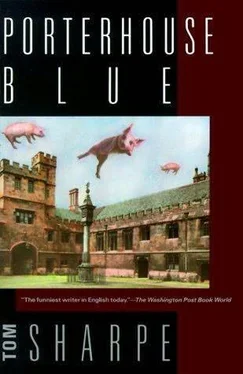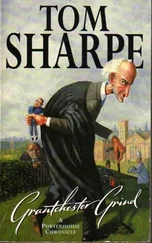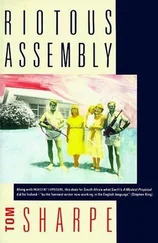At High Table the Fellows dined in moody silence. Even the Chef’s poached salmon failed to raise their spirits, dampened by the obduracy of the Master and the memory of their capitulation. Only the Dean remained undaunted, shovelling food into his mouth as if to fuel his determination and mouthing imprecations on Sir Godber simultaneously, his forehead greasy and his eyes bright with the cunning Sir Godber had recognized.
In the Combination Room, as they took their coffee, the Senior Tutor broached the topic of their next move. “It would appear that we have until Wednesday to circumvent the Master’s proposals,” he said, sipping brandy fastidiously.
“A relatively short time, if you don’t mind my saying so.”
“Short but enough,” said the Dean tersely.
“I must say I find your confidence a little surprising, Dean,” said the Bursar nervously.
The Dean looked at him with a sudden ferocity. “No more surprising than I find your lack of discretion. Bursar,” he snapped. “I hardly imagine that this unfortunate turn of events would have occurred without your disclosure of the financial state of the College.”
The Bursar reddened. “I was simply trying to point out to the Master that the changes he was proposing would place an intolerable strain on our resources,” he protested. “If my memory serves me right you were the first to suggest that the finances should be brought to his attention.”
“Certainly I suggested that. I didn’t however suggest that he should be made privy to the details of our admissions policy,” the Dean retorted.
“Gentlemen,” said the Senior Tutor, “the mistake has been made. Nothing is to be gained by post-mortem. We are faced by an urgent problem. It is not in our best interest to apportion blame for past mistakes. If it comes to that we are all culpable. Without the divisions that prevented the election of Dr Siblington as Master, we should have avoided the nomination of Sir Godber.”
The Dean finished his coffee. “There is some truth in that,” he admitted, “and a lesson to be learnt. We must remain united in the face of the Master. In the meantime I have already made a move. I have arranged a meeting with Sir Cathcart D’Eath for this evening. His car should be waiting for me now.” He rose to his feet and gathered his gown about him.
“May one inquire the purpose of this meeting?” the Praelector asked. The Dean looked down at the Bursar. “I should not like to think that our plans are likely to reach Sir Godber’s ears,” he said deliberately.
“I can assure you…” began the Bursar.
“I have requested this meeting because Sir Cathcart as you all know is President of the OPs. I think he should know what changes the Master proposes. Furthermore I think he should know the manner in which the Master has conducted himself in the matter. I fancy that there will be an extraordinary meeting of the Porterhouse Society next Tuesday to discuss the situation and I have high hopes that at that meeting a resolution will be passed censoring Sir Godber for the dictatorial attitude he has adopted in his dealings with the College Council and calling for his immediate resignation from the Mastership.”
“But, Dean, surely that is most unwise,” protested the Senior Tutor thoroughly alarmed. “If a motion of that sort is passed, the Master is bound to resign and to publish his confounded letter. I really don’t see what that is going to accomplish.”
The Bursar put down his coffee-cup with unwonted violence. “For God’s sake. Dean,” he said, “consider what you are doing.”
The Dean smiled grimly. “If Sir Godber can threaten us,” he said, “we can threaten him.”
“But the scandal, think of the scandal. It will involve us all,” muttered the Bursar desperately.
“It will also involve Sir Godber. That is precisely the point of the exercise. We shall get in first by demanding his resignation. The force of his letter to the PM will be dulled by the fact that the College authorities and the Porterhouse Society have both demanded his resignation on the grounds of incompetence and his letter to the press with its so-called disclosures will have the appearance of being the action of a slighted and bitter man. Besides I rather think you overestimate Sir Godber’s political courage. Faced with the ultimatum we shall present at the Council meeting on Wednesday I doubt if he will risk a further confrontation.”
“But if the call for his resignation has already been published…”
“It won’t have been. The motion will have been passed, I trust unanimously, but its publication will be dependent on Sir Godber’s attitude. If he persists in demanding the changes in the College, then we shall publish.”
“And if he resigns without warning?”
“We shall publish all the same,” said the Dean. “We shall muddy the issue until it is uncertain whether we forced his resignation or not. Oh, we shall stir the pot, gentlemen. Have no fear of that. If there must be dirt let there be lots of it.” The Dean turned and went out, his gown billowing darkly behind him. In the Combination Room the Fellows looked at one another ruefully. Whatever changes the Master proposed appeared minor by comparison with the uproar the Dean seemed bent on provoking.
It was the Chaplain who broke the silence. “I must say,” he shouted, “that the Chef excelled himself tonight. That soufflé was delicious.”
Outside the main gate Sir Cathcart’s Rolls-Royce waited ostentatiously as the Dean, swaddled in a heavy coat and wearing his blackest hat, hurried past the Porter’s Lodge.
Skullion opened the car door for him.
“Good evening, Skullion.”
“Good evening to you, sir,” Skullion murmured humbly.
The Dean clambered in and the car moved off, its wheels slushing through the snow. In the back the Dean stared through the window at the flurries of snowflakes and the passers-by with their heads bent against the driving wind. He felt warm and contented, with none of the uneasy feelings that had driven the Master to his Bentham. This was weather he appreciated, cold bitter weather with the river rising and the biting wind creating once again the divisions of his youth, that hierarchy of rich and poor, good and bad, the comfort and the misery which he longed to preserve and which Sir Godber would destroy in his search for soulless uniformity. “The old order changeth,” he muttered to himself, “but damned slowly if I have anything to do with it.”
Skullion went back into the Porter’s Lodge.
“Going to supper,” he told the under-porter and trudged across the Court to the kitchen. He went down the stone stairs to the kitchen where the Chef had laid a table for two in his pantry. It was hot and Skullion took off his coat before sitting down.
“Snowing again they tell me,” said the Chef taking his seat.
Skullion waited until a young waiter with a gaping mouth had brought the dishes before saying anything.
“Dean’s gone to see the General,” he said finally.
“Has he now?” said the Chef, helping himself to the remains of the poached salmon.
“Council meeting this afternoon,” Skullion continued.
“So I heard.”
Skullion shook his head.
“You aren’t going to like this,” he said. “The Master’s changes aren’t going to suit your book, I can tell you.”
“Never supposed they would, Mr Skullion.”
“Worse than I expected. Chef, much worse.” Skullion took a mouthful of Ockfener Herrenberg 1964 before going on.
“Self-service in Hall,” he said mournfully.
The Chef put down his knife and fork. “Never,” he growled.
“It’s true. Self-service in Hall.”
“Over my dead body,” said the Chef. “Over my bloody dead body.”
Читать дальше












